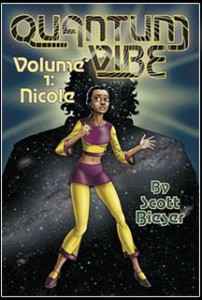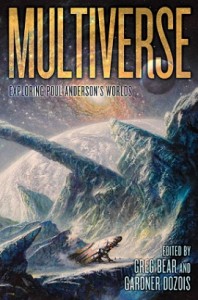This puts my small collection to shame.
Category: books (Page 13 of 20)
A few years ago, when the number of Discworld books were below 20 and I was scouring used book stores for some of the early books, I bought only paperback. Since then, I have a few hard covers, but I still usually wait for the paperbacks, despite their awful covers. If I had the money, I could scrap all those books and get the collector’s library. Each volume is only 10 quid, which means they’ll be devilishly hard to get in the US.
 I’ve been following Scott Bieser’s serialized online graphic novel, Quantum Vibe, since day one. This month the first volume of his panels was published as a book, available from the usual sources. Weighing in at 236 pages, the first volume focuses on Nicole, a young woman, often irresponsible and prone to drink and scenes, who embarks on a new career and life of adventure after getting dumped by her flake boyfriend.
I’ve been following Scott Bieser’s serialized online graphic novel, Quantum Vibe, since day one. This month the first volume of his panels was published as a book, available from the usual sources. Weighing in at 236 pages, the first volume focuses on Nicole, a young woman, often irresponsible and prone to drink and scenes, who embarks on a new career and life of adventure after getting dumped by her flake boyfriend.
In the aftermath of her depression and self-indulgance, she is fired and forced to look for new work. She interviews for a job as personal assistant to a peripatetic inventor/businessman, Dr. Seamus O’Murchadha, who has a bold and ambitious project that needs a pilot and all-around gopher. Young Nicole at first is overwhelmed, bt later accepts, and begins a journey that will take her from the sun and outward, with stops along the way at various planets and orbital stations. Continue reading
From the remarkable people at Subterranean Press, news about a vast anthology in the worlds of grandmaster sf writer Poul Anderson. Multiverse contains stories by writers like Greg Bear, Nancy Kress, Gregory Benford, and many others. Currently available as a pre-order, it will be available in limited and trade editions.
Book news round-up from NPR, including mention of a publishing company planning to bring back forgotten young adult novels from the 1930s onward.
Positive run-down on the Arthur C. Clarke Award shortlist, which seems fairly well-represented by dystopian fiction this year. Glad to see Ken MacLeod’s Intrusion among the books, even a front-runner, possibly.
Scientists build a small-scale robotic ant society. Having recently read Daniel Suarez’ novel Kill Decision, the implications are almost scary.
Interesting article at National Review, laying into sf movies and books with themes of the corporate as evil overload. Lists several books and movies with this theme, and then debunks the power of corporates. There is little coercive force behind corporations, but apologists of government force often splutter and come back with “but what about the evil influence of McDonalds or name-your-most-hated-company?” The power of the market is what they say they fear, but this really masks their distaste of popularity of things they don’t like.
Writer Anthony Pacheco has some thoughts on libertarianism and science fiction. I think there are a few more writers and books worth mentioning than the ones he covers.
Everybody compiles lists. These usually are of the “top 10” kind. I started compiling a personal list of individualist titles in the early 1990s. When author China Miéville published one entitled “Fifty Fantasy & Science Fiction Works That Socialists Should Read” in 2001, I started the following list along the same lines, but a different focus. Miéville and I have in common some titles and authors, but our reasons for picking these books probably differ greatly.
Some rules guiding me while compiling this list included: 1) no multiple books by the same writer; 2) the winners of the Prometheus Award do not automatically qualify; and, 3) there is no limit in terms of publication date. Not all of the listed works are true sf. The first qualification was the hardest, and I worked around this by mentioning other notable books in the brief notes. I mostly excluded shorts stories but included two plays, one of which appeared several thousand years ago. This is a personal list. As with any list there may be debate and questions of the compiler’s taste and sanity, etc. We read and enjoy fiction for a variety of reasons, but these books I believe are compelling for the spirit of liberty, which burns brightly within their pages.
Some of these books I last read decades ago, others very recently. They are ordered alphabetically by author, and mostly ignore the political beliefs of the author: the idea of liberty is one shared across the political spectrum. While some political philosophies clearly are at odds with individual liberty, names and labels change over time, and thus someone who considers themselves a socialist may end up writing a book that seems to counter certain views of socialism. Liberalism in the 19th and early 20th centuries is far closer to modern ideas of individualism than the idea of capitalism at that time.
Also, books have a life and soul of their own, often at odds with those of the author. Authors’ life experiences amidst certain world events also influence their fiction. As they fictionalize their experiences, thoughts and emotions bubble up into their fiction in ways they must see through to the end. Thus, you have the socialist writer George Orwell penning perhaps the greatest critique ever of socialism:Animal Farm. Once released into the wild, a book no longer belongs to the author, and must be judged on its own. Continue reading